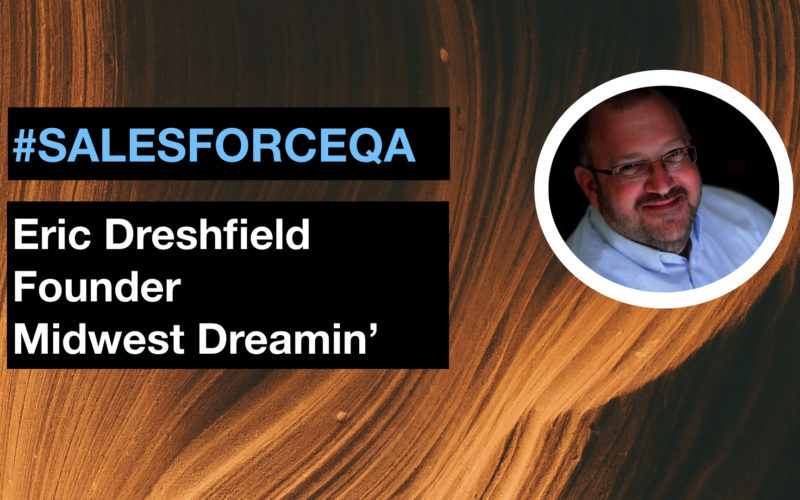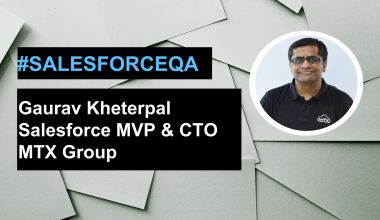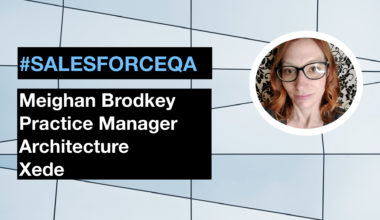In our most recent #SalesforceQA, we caught up with Eric Dreshfield, Founder at Midwest Dreamin’, VP of Delivery at ITequality and Salesforce MVP every year since 2013 – making 2020 his 7th year as an MVP.
Eric talks to us about how he got started with Salesforce, discusses his opinions on certifications and offers us his top 3 pieces of advice for career success.
Salesforce Republic (SR): You’ve had an interesting career and have been working in the Salesforce ecosystem since 2009. Could you talk us through your journey and how you got to where you are today?
Eric Dreshfield (ED): I lost a really great job at the end of 2005 after essentially telling the president of the company that he had unrealistic expectations, and something he wanted to be done in 3 weeks would take 3 months. Over the course of the next 2.5 years, I worked whatever jobs I could find just to keep food on the table and a roof over our heads. Sometimes working between 3 and 5 jobs and travelling for up to 20 hours a day. Eventually, I stumbled into a temporary 8-week role as a Technical Support Agent for a software company. The initial 8-weeks turned into 7 months and the temp job as a Tech Support Agent turned into a Business Analyst role to help the company roll out Salesforce.
I spent 2 and a half years with this company and a further 2 years at an infant nutrition company as a Reporting Analyst. I then decided to pursue a role with a Partner after seeing a demo of one of their products at Dreamforce. Suddenly I found that I had become a marketer for an ISV Partner – and I loved it.
After a couple of years in this role, as typically happens in the tech world, things change. The company I so wanted to work for just 2 years earlier, was no longer the company I was working for. It was time to make a change, again. Once again, I took the non-traditional approach to a job search. I didn’t look at who had open roles, I searched for a company I knew well, and whose values strongly aligned with mine. After a few conversations, I landed my current role, as Vice President of Delivery at ITequality, a registered Salesforce implementation Partner, specializing in Salesforce CPQ.
SR: What would you say are the key benefits of pursuing a career in Salesforce?
ED: The possibilities are limitless. You can do whatever kind of work, for whatever type of organization you want to. If you don’t have the exact skills today for the role you really want – Trailhead can help you skill up and get you better prepared for what your next role needs.
SR: Could you talk about any challenges you have faced throughout your career in Salesforce?
ED: Like almost anything worth pursuing, my career journey hasn’t been without challenges. There’s not a day that goes by where I don’t have some impostor syndrome creeping in, causing me to wonder if I can really do the job I was hired to do. To top it off, as a multi-year Salesforce MVP, I often wonder if I’m doing enough for the community. I see so many others in the ecosystem that I feel are helping so many more people than I could ever help.
SR: As the Founder of the incredibly successful Salesforce community group, Midwest Dreamin’, could you explain the importance of such community groups in the Salesforce ecosystem?
ED: Community conferences like Midwest Dreamin’ (and the other 35 or so that now exist around the world) are becoming increasingly important for Salesforce customers, admins, and developers. They are closer to home and much less expensive to attend than Dreamforce.
For many, attending a community conference has become their main Salesforce event for the year. Lots of people just can’t afford to miss a full week of work to attend Dreamforce, or their companies don’t have the budget for it. In addition, the focus of community conferences is driven by the community, rather than Salesforce (the company). So often the content presented in breakout sessions is more meaningful to attendees.
SR: In your opinion, how vital is the Salesforce community to personal success in the ecosystem and how can being involved benefit careers?
ED: For me personally (other than my very first role in the ecosystem) I feel like my community involvement has been the primary driver for 100% of my success and career trajectory. Being actively involved in the community demonstrates to a potential employer that you have internal motivation, you’re curious, you want to help others, and that you value self-education and continuous learning.
SR: Moving on to certs, do you think that they are essential when it comes to success in Salesforce?
ED: Ah… certifications. An interesting topic of conversation in Salesforce. I currently hold zero Salesforce certifications. Yes, you read that right ZERO certs. The big goose egg! It comes as a surprise to most people when they learn this about me. It’s not that I haven’t tried – I’ve taken and failed the Admin exam three times. I don’t think it’s simply that I’m bad at taking exams. Personally, I think it’s more a result of my experience, and that I’ve never been the Admin for an organization. I don’t have the practical experience in a lot of what the exam covers.
That said, I do think there is value in achieving certifications. It’s a widely accepted industry standard that many companies look for in potential employees. Some organizations even require employees to hold certain certifications as part of their employment. Are they essential to success? No, not at all. But it all depends on what you want to do with your Salesforce career. What path you want to follow and which organizations you want to work for.
Will certifications guarantee you a specific salary or a certain role? Again, no. But they certainly can help make all these things possible. However, it’s quite possible that people can pass exams and become certified without any practical, real-world experience with the platform. And for both those looking for their first role in the ecosystem as well as employers looking to hire, this can be a tough spot to be in as practical experience.
SR: What would you say are some of the key traits needed for a fruitful Salesforce career?
ED: Stay teachable. Don’t ever think you know it all. There’s no way you can. There are so many features, use cases, options and opportunities to accomplish things with Salesforce. It’s inconceivable for someone to know all of the platform’s capabilities.
Stay curious. Don’t be afraid to try new things (in a dev org, please!). And don’t be afraid of exhibitors in expo halls. Take them head-on, challenge them to show off their product, and then try to come up with a situation that they can’t solve. Talking to members of the ever-expanding partner community is a great way to discover ways to expand your companies use of the platform. I’m never surprised when I walk into an expo hall and have a “Wow, I didn’t know you could do that with Salesforce” moment.
Keep learning. Both of the previous two traits lead up to this one. Read blogs, hit Trailhead, review the release notes, watch videos, attend events, and talk to people! There are so many ways to learn something new in Salesforce.
SR: Finally, could you give us your top 3 pieces of advice when it comes to achieving success in the ecosystem?
ED: Here are the top pieces of advice I’ve received throughout my career in Salesforce.
1. Build a personal brand.
Ok, so it’s not as easy as getting out of bed and saying, “Today’s the day I launch my brand.” You have to start somewhere. Consider blogging, and yes, I know there are a lot of blogs out there that talk about Salesforce. I read many of them, and they are all as unique as the individuals who write them.
I started blogging as a way to help me remember things. Then when I published the blogs, I discovered people were reading them. Somewhere out there amongst the millions of Salesforce users, there is someone who will find your ramblings not just interesting but useful.
There are plenty of other ways to build a brand. So, if blogging isn’t your thing, or scares the pants off of you, do something else! Submit a session to speak at a community event or Dreamforce. Start a Twitter account (if you don’t already have one) and get past being a lurker. Start commenting on others’ posts, and soon you’ll find yourself sharing information. Be brave, get out there and do something that’s authentically you!
2. Talk to people.
If you’re at an event and you encounter someone you don’t know, a simple introduction like “Hi, I’m Eric. I’ve been using Salesforce since 2009. How about you?” will break the ice. Some of the greatest people in my life I met by taking a chance and simply talking to them. In this ecosystem, I don’t think anyone will bite your head off for that. It’s really quite amazing how friendly everyone is, and how willing they are to share their stories of challenges and successes. You never know who you’ll meet – it could be a co-worker of your brother-in-law (true story, my first Dreamforce in 2011) or your next manager (another true story, met during a session at Dreamforce 2014 – two years later I was working with that person).
3. Above all else – don’t be afraid to ask for help.
Everyone in this ecosystem has a certain skill, a specialty if you will. If you put a question out there in the Trailblazer Community, on Twitter with the #Askforce, on StackExchange or whatever social channel you choose, you’ll quickly discover people have the answers to your questions and are more than happy to share. It’s a lot like Wayne Gretzky said, “You miss all the shots you don’t take.” – but in this case, “The only stupid question is the one left unasked.”
If you see a theme in all my ramblings here, you’re dead on. For me, it’s all about the people you meet and the connections you make. Hit me up on Twitter @ericdresh, and hopefully, I’ll see you at Midwest Dreamin’ or Dreamforce!


